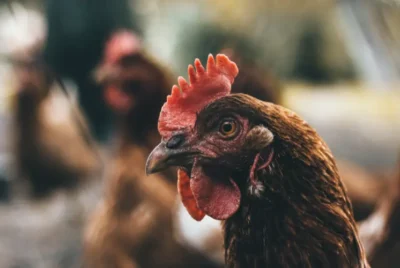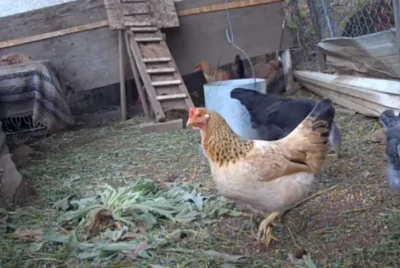Raising A Lavender Wyandotte: Essential Tips for New Owners
Have you ever heard about Lavender Wyandotte chickens? They’re more than just their pretty lavender color. These birds are a heritage breed, meaning they’re a traditional breed known for their longevity, productivity, and overall hardiness.
Big Poultry may want you to believe you need their selectively bred chickens, but Lavender Wyandottes offer a special charm and advantage that you can’t ignore! Let’s break down the secrets that big poultry firms might not want you to know about these stunning birds.
Quick Overview of Lavender Wyandotte Chickens
- Origin: America
- Type: Standard Large Fowl
- Size: Heavy (7-8 lbs)
- Rarity: Extremely Rare
- Purpose: Dual Purpose (Egg Laying and Meat)
- Color: Lavender
- Egg Laying: Good (4/week, 200/year)
- Egg Color: Cream
- Egg Size: Medium/Large
- Unique Feature: Rose Comb
- Cold Hardiness: Excellent
- Heat Tolerance: Good
- Docile: Yes
- Broody: Possible
- Personality: Lively, Active, Gentle, Friendly
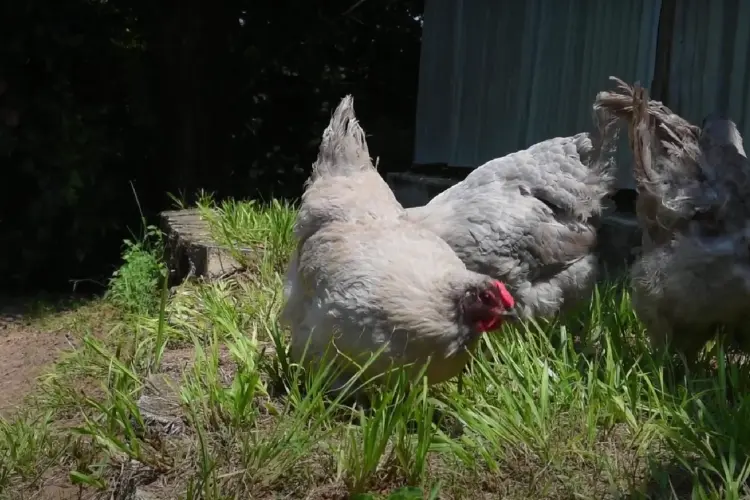
History and Background of Lavender Wyandotte Chickens
The Lavender Wyandotte, as its name suggests, is a variant of the Wyandotte breed that carries the lavender (self-blue) gene, which gives it its distinctive color. The original Wyandotte breed was developed in the United States during the late 19th century, named after the Wyandot people, a native tribe.
These chickens were bred for their dual-purpose characteristics – both for meat and eggs. However, the lavender color is a recent addition, resulting from careful selective breeding by dedicated breeders.
This particular color variation is not as common as others, and therefore it’s considered extremely rare. Despite their rarity, Lavender Wyandottes continue to grow in popularity due to their beautiful plumage, docile nature, and robust productivity, embodying the enduring legacy of the Wyandotte breed while adding a touch of uniqueness.
Raising Lavender Wyandottes
Understanding their behavior and social dynamics
Raising Lavender Wyandotte is a rewarding experience thanks to their friendly and docile nature. These birds are known for their lively and active behavior, yet they are also gentle, making them excellent additions to a mixed flock. They interact well with other chickens, and their docility makes them less prone to exhibiting aggressive behaviors.
Being a heritage breed, Lavender Wyandottes are robust and hardy, requiring minimal special care. They can adapt to various living situations, from free-range environments to confined spaces, making them a suitable choice for different kinds of poultry keepers.
These chickens also exhibit possible broodiness. Some hens might show a strong inclination to sit on and hatch their eggs, which can be advantageous if you’re interested in naturally expanding your flock. Overall, understanding the social dynamics and behavior of Lavender Wyandotte can help ensure a harmonious and productive backyard chicken experience.
Daily Care and Maintenance
Daily care and maintenance of Lavender Wyandottes, like with most chickens, involve ensuring they have access to clean water, nutritious feed, and a safe, clean living environment.
- Provide a balanced poultry diet to your chickens. You can use a commercially prepared feed designed for layers which contain essential nutrients. Ensure they always have access to this feed and supplement it with vegetables, fruits, and occasional treats.
- Chickens need access to fresh, clean water at all times. Check their water supply daily and refill as needed. In freezing weather, use a heated waterer to prevent the water from icing over.
- Their coop should be cleaned regularly to prevent diseases. Replace bedding as needed to keep the coop dry and odor-free. Ventilation is important to avoid respiratory issues.
- Conduct regular health checks on your chickens. Look for signs of common poultry diseases such as respiratory issues, parasites, and injuries.
- Lavender Wyandottes are good for coop life but also like room to roam. If possible, provide a secure outdoor space where they can scratch and peck, which is essential for their well-being.
- Ensure the coop is secure from predators. The coop should be sturdy with a lockable door, and the outdoor run should be fenced, ideally with a roof or netting to protect from aerial predators.
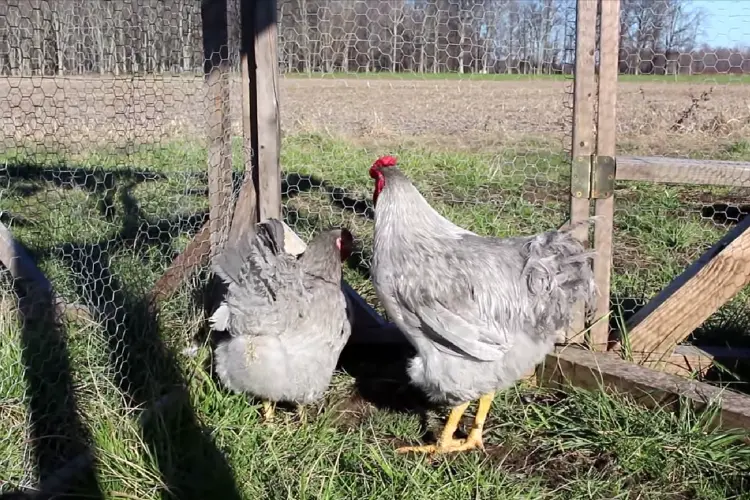
Health Concerns and Treatment
Lavender Wyandottes are generally robust and hardy chickens. However, they can still be susceptible to common poultry diseases and conditions. It’s important to monitor their health regularly and provide appropriate treatment as necessary. Here are a few common health concerns:
Parasites
Like all chickens, Lavender Wyandotte can be affected by both external parasites like mites and lice, and internal parasites such as worms. Regular inspections and appropriate treatments are necessary.
Respiratory Diseases
Chickens can be susceptible to various respiratory conditions, often sneezing, coughing, and difficulty breathing. Good coop ventilation and cleanliness can help prevent these issues.
Avian Influenza
Also known as bird flu, this is a highly contagious viral disease that can spread quickly in a flock. Vaccination can help prevent this disease.
Marek’s Disease
This is a viral disease that can cause paralysis, weight loss, and vision problems. Vaccination is usually given to chicks to prevent this disease.
Coccidiosis
This is a parasitic disease that affects the digestive tract, particularly in younger birds. It’s often caused by poor sanitation, so keeping the coop clean is essential for prevention.
Egg Binding
This condition occurs when a hen is unable to pass an egg. Various factors, including poor nutrition or stress, can cause it. If suspected, immediate veterinary care is necessary.
Benefits of Raising Lavender Wyandottes
Dual Purpose
Being a dual-purpose breed means Lavender Wyandottes have been bred to excel in both egg-laying and meat production. This makes them particularly valuable to smallholders and homesteaders who want a chicken that can provide a reliable source of both food types.
Read also: 20 Best Giant Chicken Breeds ( For Meat + Egg Production)
Good Egg Layers
Lavender Wyandottes are reliable layers, producing around 200 light brown eggs annually. This steady production can be a great boon for families wanting a consistent supply of homegrown eggs.
Hardy Breed
The breed’s robustness makes it adaptable to various climatic conditions, from cold winters to hot summers. The rose comb – smaller and closer to the head – is less prone to frostbite in cold conditions, making them an excellent choice for colder climates.
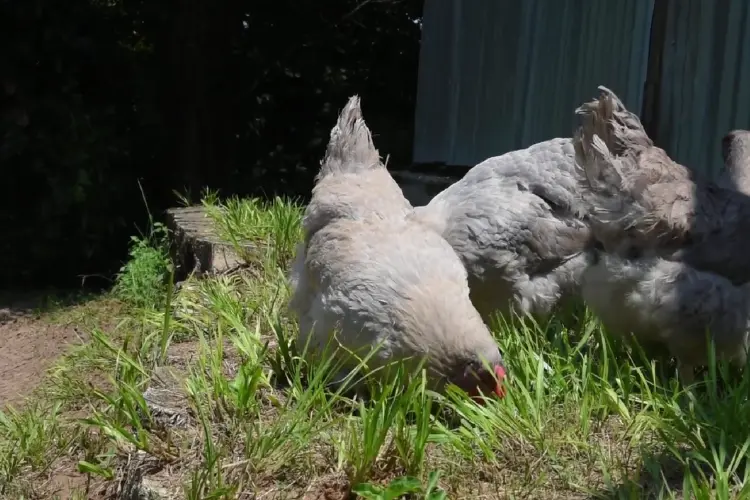
Unique Appearance
Lavender Wyandottes are known for their striking lavender-colored plumage. This unique coloration is not common in many chicken breeds, so they stand out in the flock and add a beautiful variety to your backyard.
Docile Temperament
These birds are known for their calm and friendly nature. They typically get along well with other chickens in a mixed flock, making flock management easier. Their docile nature also makes them a good choice for families with children as they can be handled relatively easily.
Low Maintenance
As a hardy and robust breed, Lavender Wyandottes aren’t overly demanding. They don’t require special feed and are less prone to health issues compared to some other breeds. This resilience and low-maintenance nature make them an excellent choice for novice poultry keepers.
Potential Broodiness
While not all Lavender Wyandottes will become broody, those that do can provide a natural way to increase your flock size without the need for an incubator. A broody hen will sit on her eggs until they hatch, caring for the chicks once they’ve emerged.
FAQ
Are Lavender Wyandottes Hard to Find?
Yes, due to their unique coloration, Lavender Wyandotte is considered quite rare compared to other Wyandotte color variations.
What Is the Color of Lavender Wyandotte’s Eggs?
Lavender Wyandotte lays cream-colored eggs. Although they are slow to mature sexually, once they do, hens typically produce a substantial quantity of these cream-colored eggs.
Conclusion
Raising Lavender Wyandotte is a rewarding experience with aesthetic beauty and practical benefits. Known for their unique lavender plumage, good egg-laying abilities, and friendly temperament, they are a joy to raise.
Although they require essential care and maintenance like any other chicken breed, their hardiness and adaptability make them an excellent choice for first-time and experienced poultry keepers.
As long as you ensure a balanced diet, comfortable living conditions, and regular health checks, raising Lavender Wyandottes promises to be a fulfilling and enriching journey.


